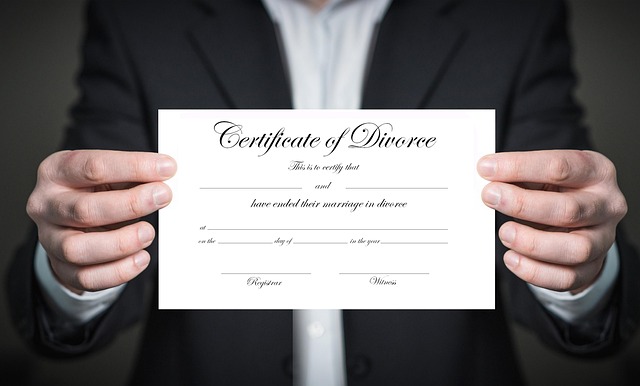Understanding the differences between uncontested and contested divorces is key when ending a marriage. Uncontested divorces involve cooperative spouses agreeing on terms, leading to speedier processes with less legal fee and emotional strain. Contested divorces arise from disagreements, necessitating legal battles where a divorce lawyer advocates for clients' interests. Both require skilled representation; uncontested cases focus on efficiency, while contested scenarios involve intense negotiation or litigation. Divorce mediation offers an alternative, fostering cooperation and helping couples reach mutually agreeable separation agreements without adversarial lawyers. A separation agreement is crucial in both types of divorces, detailing terms like property division and child custody. A divorce lawyer ensures rights are protected throughout the process, whether it's amicable mediation or contested litigation.
“Navigating the complex landscape of divorce can be a challenging task, especially when deciding between an uncontested or contested legal separation. This article serves as your guide through the intricate processes, offering insights into various aspects of divorce representation.
From understanding the distinctions between uncontested and contested divorces to exploring the benefits of mediation and crafting separation agreements, you’ll discover valuable information. We also delve into the pivotal role a divorce lawyer or family law attorney plays in ensuring a smooth, amicable divorce process and a favorable divorce settlement.”
- Understanding Uncontested and Contested Divorces: What You Need to Know
- The Role of a Divorce Lawyer in Navigating the Legal Separation Process
- Divorce Mediation: An Amicable Approach to Divorce Representation
- Creating a Separation Agreement: Key Elements and Divorce Settlement Considerations
Understanding Uncontested and Contested Divorces: What You Need to Know

When navigating the complex world of ending a marriage, understanding the distinctions between uncontested and contested divorces is paramount. An uncontested divorce involves cooperative spouses who agree on all terms, including property division, child custody, and support. This amicable approach often results in a simpler, faster process, minimizing legal fees and emotional strain. On the other hand, a contested divorce arises when spouses fail to resolve disagreements, leading to a protracted legal battle. Here, a divorce lawyer plays a crucial role in advocating for their client’s interests, focusing on securing favorable separation agreements and divorce settlements.
Both paths demand skilled divorce representation, but the strategies differ markedly. In the uncontested scenario, the focus is on efficiency, while contested cases require intense negotiation or litigation. Divorce mediation can serve as an alternative to court for resolving conflicts amicably, fostering a more cooperative atmosphere. Ultimately, whether the divorce process is uncontested or contested, seeking guidance from a family law attorney ensures that your rights are protected and that you make informed decisions throughout the divorce process.
The Role of a Divorce Lawyer in Navigating the Legal Separation Process

When facing a divorce, whether it’s uncontested or contested, involving a divorce lawyer is crucial for navigating the legal separation process successfully. A skilled divorce attorney can guide clients through every step, ensuring their rights and interests are protected throughout the entire divorce procedure. They play a pivotal role in facilitating an amicable divorce by helping couples reach mutually acceptable agreements on matters such as child custody, asset division, and spousal support.
For uncontested divorces, where both parties agree on all terms, a divorce lawyer can still provide valuable representation to ensure the accuracy and fairness of legal documents like separation agreements. In contrast, during contested divorces where there are disagreements, a family law attorney acts as an advocate, representing their client’s best interests in court proceedings, including negotiations, mediations, or trial. They help couples reach a satisfactory divorce settlement or decide on terms through the judicious use of legal expertise and strategic planning.
Divorce Mediation: An Amicable Approach to Divorce Representation

Divorce Mediation offers a significantly more amicable approach to divorce representation compared to traditional legal avenues. This alternative method involves a neutral third-party, often referred to as a mediator, who facilitates open communication between both parties. The goal is to reach a mutually agreeable separation agreement without the need for extensive court proceedings or adversarial divorce lawyers. This process is particularly beneficial for couples seeking an uncontested divorce, aiming for a swift and amicable resolution with minimal legal involvement.
For those facing more complex or contentious situations, known as contested divorces, mediation can still play a crucial role in laying the groundwork for a eventual divorce settlement. By establishing a safe and collaborative environment, mediators help spouses navigate sensitive issues, such as asset distribution, child custody, and spousal support. Ultimately, this approach empowers couples to maintain control over their divorce process while reducing legal fees and emotional strain associated with traditional litigation. Thus, whether initiating an uncontested or contested divorce, considering divorce mediation can prove invaluable in achieving a fair and amicable outcome.
Creating a Separation Agreement: Key Elements and Divorce Settlement Considerations

When navigating the divorce process, whether it’s an uncontested or contested divorce, one crucial step is creating a separation agreement. This legal document outlines the terms and conditions agreed upon by both parties regarding various aspects of their divorce settlement. Key elements often include property division, spousal support (alimony), child custody and visitation arrangements (if applicable), and the distribution of debt. A well-crafted separation agreement can help streamline the divorce process, providing a clear roadmap for both individuals to follow.
In an uncontested divorce, where both parties agree on all terms, a separation agreement serves as the primary legal document. It’s drafted with input from both individuals and is typically reviewed by each party’s respective divorce lawyer or family law attorney. In contrast, contested divorces involve disagreements between spouses, necessitating the assistance of a divorce attorney to advocate for their client’s interests. Here, the role of a neutral third party, such as a divorce mediator, might be required to facilitate negotiations and help reach a mutually acceptable divorce settlement.
When faced with a divorce, whether it’s uncontested or contested, the decision to involve a divorce lawyer or mediator can significantly impact the outcome. While legal separation and crafting separation agreements are complex processes, a family law attorney can guide you through each step, ensuring your rights are protected. Divorce mediation offers an amicable approach, fostering collaboration between spouses for a mutually beneficial settlement. Ultimately, whether navigating a contested divorce or seeking an uncontested resolution, professional divorce representation can help you navigate the legal complexities and secure a favorable divorce settlement.
